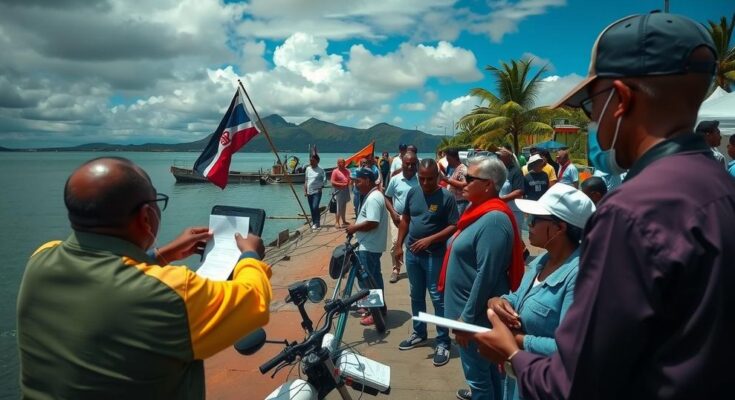Mauritius recently voted in a parliamentary election dominated by discussions of political stability and economic growth. The contest has been overshadowed by a phone-tapping scandal involving leaked conversations among key political figures, leading to debates over civil liberties. Prime Minister Pravind Jugnauth’s administration is challenged by opposition figures, as both sides express optimism ahead of the results, expected soon.
Mauritius recently held a parliamentary election, a crucial event highlighting the country’s pursuit of political and economic stability. The election followed a significant agreement in which the United Kingdom transferred sovereignty over the contentious Chagos Islands to Mauritius, following prolonged negotiations. However, the political landscape became tumultuous due to revelations of illegally recorded phone conversations involving prominent political figures, diplomats, and journalists that were released online. In response to the growing scandal, authorities briefly imposed a ban on social media, a decision they later rescinded amid backlash, raising concerns regarding civil liberties and the health of democracy within the nation. The political contest primarily featured two factions: the ruling Militant Socialist Movement, led by Prime Minister Pravind Jugnauth, who sought re-election, and the opposition Alliance of Change, spearheaded by former Prime Minister Navin Ramgoolam. Both parties expressed confidence in their chances of victory, pledging efforts to combat poverty and inflation. Voter turnout reached 70 percent before polls closed, although comparisons to previous elections were not disclosed. Results from this pivotal election are expected imminently. Polling stations housed police to ensure election security, while observers from organizations such as the African Union monitored the electoral process. Ramgoolam raised concerns about potential electoral fraud, but reported that the voting process was largely smooth. Jugnauth similarly declared confidence in his party’s prospects, attributing voter support to the government’s performance. With over one million registered voters participating in this election, Mauritius retained its status as a stable democracy, despite ongoing challenges and a noted rise in allegations of corruption. The island nation, with a population of 1.3 million, has historically achieved remarkable consistency and growth since gaining independence in 1968, primarily through tourism and financial services. Though the GDP grew by seven percent in 2023, critics emphasized the necessity for economic diversification amid rising governance concerns. Democracy researcher Roukaya Kasenally indicated that the past five years have seen diminished institutional checks and an increase in corruption, citing scandals tied to Covid-19 procurement and political oppression. Such issues have affected Mauritius’s governance standing, recently knocking it from the top position in the Ibrahim Index, which evaluates governance quality across Africa. Political leadership has alternated among only three families since independence, with both Jugnauth and Ramgoolam inheriting their positions through family legacy. Meanwhile, a new political entity, the Linion Reform alliance, emerged, appealing to voters through a message of anti-corruption and change. The recent Chagos deal was hailed by Jugnauth as a milestone in the nation’s process of decolonization, despite ongoing concerns about long-term ramifications related to the US military base located on Diego Garcia.
Mauritius is notable for its longstanding democratic framework, which has fostered economic growth and political stability since its independence from British rule in 1968. The recent parliamentary election serves as a critical reflection of the citizens’ engagement with broader political issues, especially in the wake of the notable sovereignty transfer of the Chagos Islands. However, the fallout from a scandal surrounding illicitly recorded communications among public figures signifies deeper tensions in the political atmosphere, raising alarm regarding the health of democratic institutions and civil rights. The political landscape is characterized by a historical dominance of a few key families, with continuous calls from opposition parties advocating for structural reform against nepotism and corruption. Amid these dynamics, the role of governance and its impact on national stability remains a crucial concern for citizens and analysts alike.
The recent parliamentary elections in Mauritius underscore significant political dynamics marked by historical issues and contemporary scandals. The implications of phone-tapping allegations, combined with the legacy of political families and ongoing economic challenges, provoke critical dialogues concerning governance and democratic integrity. As citizens seek stability and reform, the election results will herald the next chapter in Mauritius’s political narrative amidst a backdrop of increasing scrutiny of its democratic principles.
Original Source: www.news-expressky.com




